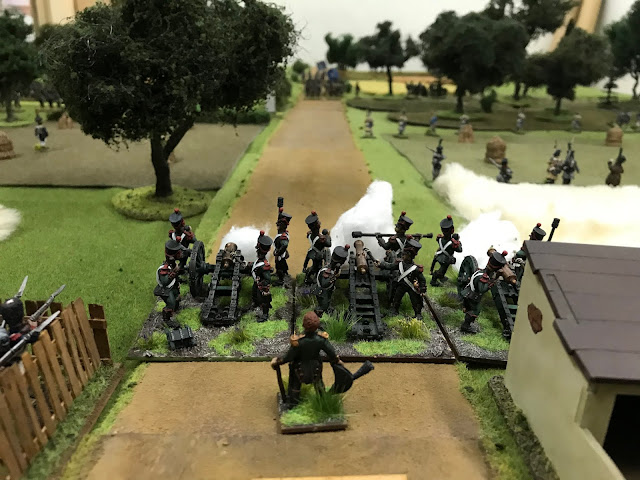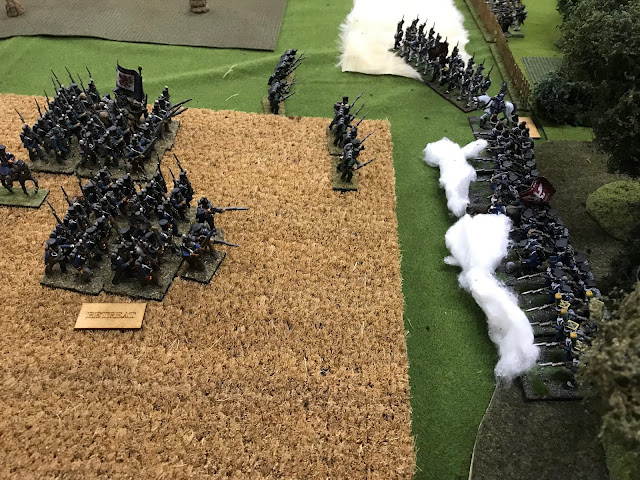W minioną niedzielę rozegrałem kolejną bitwę w General de Brigade. Oto krótki opis tego starcia.
Last Sunday I played another battle with General de Brigade rules. Here's a brief description.
Wrzesień 1813 roku, Saksonia. VIII korpus księcia Józefa Poniatowskiego osłania manewry Wielkiej Armii. Główna droga do Drezna i na tyły wojsk Napoleońskich prowadzi przez wieś Burgenhof, obsadzoną przez blisko 4000 polskich piechurów i 6 armat. We wsi znajduje się także kwatera główna księcia Poniatowskiego. Cała kawaleria VIII korpusu rozciągnięta jest na znacznej przestrzeni, osłaniając skrzydła piechoty i boczne drogi, starając się nie dopuścić do oskrzydlenia głównego zgrupowania.
September 1813, Saxony. Prince Józef Poniatowski's 8th Corps covers the maneuvers of the Grande Armee. The main road to Dresden and the rear of the Napoleonic army leads through the village of Burgenhof, occupied by nearly 4,000 Polish infantrymen and 6 cannons. In the village there is also the headquarters of Prince Poniatowski. The entire cavalry of 8th Corps is stretched out over a considerable space, shielding infantry flanks and side roads, trying to prevent the main group from being surrounded.
Od południa nadciągała kolumna pruskiej piechoty z II Korpusu generała von Kleista. Na czele szła 9. brygada generała von Klüxa złożona z 1. Wschodniopruskiego Pułku Piechoty, 6. Rezerwowego Pułku Piechoty oraz 7. Pułku Landwhery Śląskiej, wspierana przez 2 baterie artylerii, razem prawie 6500 bagnetów i 12 armat.
From the south came a column of Prussian infantry from the Second Corps of General von Kleist. At the head was the 9th brigade of General von Klüx consisting of the 1st East Prussian Infantry Regiment, the 6th Reserve Infantry Regiment and the 7th Regiment of the Silesian Landwher, supported by 2 artillery batteries, together almost 6,500 bayonets and 12 cannons.
Polacy zajęli pozycję we wsi, rozstawiając baterię artylerii na drodze, asekurowaną przez 3 bataliony piechoty i woltyżerów generała Izydora Krasińskiego. Na lewym skrzydle rozmieściły się oddziały generała Małachowskiego, a na prawym, za lasem- 2 bataliony pułku Nadwiślańskiego, dowodzone przez pułkownika Stanisława Malczewskiego.
The Poles took a position in the village, setting up an artillery battery on the road, supported by three battalions of infantry and voltigeurs of general Izydor Krasiński. On the left wing, General Małachowski's troops were deployed, and on the right, behind the forest - two battalions of the Vistula Regiment, commanded by Colonel Stanisław Malczewski.
O godzinie 5 po południu na drodze pojawił się tuman kurzu, zwiastujący zbliżanie się nieprzyjaciela. Von Klüx większość sił posłał wzdłuż głównej drogi, by ominąć las zasłaniający prawą flankę Polaków. Na lewym skrzydle rzucił do natarcia 6. Rezerwowy Pułk Piechoty, który najszybciej zbliżał się do polskich linii.
At 5 pm, a cloud of dust appeared on the road, heralding the approach of the enemy. Von Klüx sent most of his units along the main road to avoid the forest covering the right flank of the Poles. On the left wing, he attacked with the 6th Reserve Infantry Regiment, which approached Polish lines very fast.
Tymczasem artyleria ustawiona na drodze rozpoczęła ostrzał 1. Wschodniopruskiego Pułku Piechoty, zadając pewne straty zwartym kolumnom Prusaków. Batalion grenadierów, wsparty przez Jegrów skręcił w lewo, zamierzając z marszu zaatakować pozycję Malczewskiego. Nasiał się ogień tyralierów, którzy usiłowali osłabić formację przeciwnika. Odezwały się też w końcu pruskie armaty, odprzodkowane wzdłuż ścieżki, naprzeciwko centrum i lewego skrzydła Polaków.
Meanwhile, the artillery set on the road began shelling the 1st East Prussian Infantry Regiment, causing some losses to the compact columns of the Prussians. The battalion of grenadiers, supported by Jaegers, turned left, intending to attack Malczewski's position from the march. The fire of the skirmishers, who were trying to weaken the opponent's formation, sowed. Finally, Prussian cannons were heard, deployed along the path, in front of the center and the left wing of the Poles.


Tyralierzy 6. Rezerwowego Pułku Piechoty przepędzili polskich woltyżerów z przedpola, a zwarte kolumny uderzyły na stojący w lesie 3. Pułk Piechoty. Celna salwa zmieszała jednak szeregi atakujących- jeden batalion zatrzymał się w miejscu, a drugi rzucił do ucieczki. Na przeciwległej flance Prusakom nie poszło wcale lepiej. Atakujący na zwarte linie Pułku Nadwiślańskiego grenadierzy i fizylierzy zostali krwawo odparci- pierwsi wycofali się w nieładzie na drogę, a drudzy cofali się krok za krokiem, ponosząc ciężkie straty od celnych salw Polaków.
The skirmishers of the 6th Reserve Infantry Regiment chased away the Polish voltigeura from the foreground, and dense columns hit the 3rd Infantry Regiment standing in the forest. Powerfull volley mixed the ranks of attackers - one battalion stopped in place, and the other was forced to escape. On the opposite flank, the Prussians did not go any better. Attacking on the dense lines of Vistula Regiment, grenadiers and fusilieurs were bloodily repulsed - the first retreated in disorder on the road, while the others retreated step by step, incurring heavy losses from aimed volleys of Poles.
W centrum pozostałe bataliony 1. Wschodniopruskiego Pułku rozwinęły się w linię i pod ogniem kartaczy posuwały się mozolnie w stronę wsi. Tyralierzy nękali polskich artylerzystów celnym ogniem, lecz ci uwijali się przy działach i cały czas zasypywali nieprzyjaciela gradem śmiercionośnego ołowiu.
In the center, the remaining battalions of the 1st East Prussian Regiment deployed into line and moved slowly towards the village under the cannister fire. The skirmishers harassed the Polish artillery with accurate fire, but Poles were tearing around the guns, and they were constantly flooding the enemy with a hail of deadly lead.

Sytuacja na lewym skrzydle Polaków zaczęła się tymczasem zmieniać na niekorzyść. Co prawda dowódca 6. Rezerwowego Pułku spanikował i uciekł z pola walki, zostawiając swoich żołnierzy na pewien czas bez dowódcy, lecz nowy oficer oddelegowany przez von Klüxa ze swojego sztabu, ambitny młodzieniec, szybko przywrócił porządek i poderwał żołnierzy do ponownego natarcia. Salwa Polaków nie zrobiła tym razem na nich większego wrażenia i Prusacy parli dalej naprzód, z nastawionymi bagnetami. Widząc to, żołnierze 3. Pułku zaczęli łamać szyk i cofać się, co po chwili przerodziło się w powszechną rejteradę. Wspierający ich 15. Pułk Piechoty także został zmuszony do odwrotu, co zagroziło całej lewej flance sił Poniatowskiego.
In the meantime, the situation on the left wing of the Poles has changed badly. Admittedly, the commander of the 6th Reserve Regiment panicked and escaped from the battlefield, leaving his soldiers for some time without a commander, but a new officer sended by von Klüx from his staff, an ambitious young man, quickly restored order and picked up soldiers to re-attack. The Poles' volley did not impress them this time, and the Prussians pushed forward, their bayonets fixed. Seeing this, the soldiers of the 3rd Regiment began to break the formation and retreat, which after a while turned into a common retreat. Supporting 15th Infantry Regiment was also forced to retreat, which threatened the entire left flank of Poniatowski's forces.




Również na prawym skrzydle sytuacja uległa znacznemu pogorszeniu. Miejsce grenadierów i fizylierów 1. Pułku zajęły masy Landwhery Śląskiej z 7. Pułku, które rzuciły się do natarcia na żołnierzy Malczewskiego. Salwa Polaków nie przyniosła żadnego efektu i dwie kolumny dopadły polskich pozycji. Wywiązała się krótka i brutalna walka wręcz, w ruch poszły bagnety, kolby i pięści, lecz w końcu Polacy ulegli ponad dwukrotnej przewadze liczebnej Prusaków i wycofali się w nieładzie, ponosząc przy tym dotkliwe straty. W polskich liniach ziała teraz potężna wyrwa, w którą wlewały się zastępy pruskiej piechoty. Generał Krasiński posłał naprzód 6. Pułk Piechoty, by związać przeciwnika i zapobiec całkowitej zagładzie prawego skrzydła. Drugi batalion Pułku Nadwiślańskiego także stawiał dzielny opór, ostrzeliwując z bliska Landwherę i zadając jej dotkliwe straty. Sytuacja na jakiś czas została opanowana.


The situation has alsoworsened significantly in the right wing. The place of grenadiers and fusiliers of the 1st Regiment was occupied by the masses of the Silesian Landwher from the 7th Regiment, which rushed to attack the Malczewski's soldiers. The volley of the Poles did not bring any effect and the two columns got Polish positions. A short and brutal melee broke out, bayonets, buttstocks and fists went into motion, but in the end the Poles succumbed to more than two times the size of the Prussians and retreated in disarray, at the same time suffering severe losses. There was now a huge gap in the Polish lines, into which the hosts of the Prussian infantry poured in. General Krasiński sent the 6th Infantry Regiment to tie up the opponent and prevent the complete destruction of the right wing. The second battalion of the Vistula Regiment also put up a brave resistance, firing at Landwher and giving severe losses to the enemy. The situation has been mastered for some time.



W centrum ogień pruskich tyralierów oraz zwartych formacji uciszył jedną sekcję polskiej baterii, lecz pozostałe dwie nadal pluły kartaczami, zmuszając w końcu Prusaków do odwrotu. Na lewym skrzydle natomiast skuteczny kontratak przeprowadził 1. Pułk Piechoty dowodzony przez pułkownika Ludwika Piotrowskiego. Rozgromił on jeden z pruskich batalionów a panika i dezorganizacja wkrótce ogarnęły pozostałe oddziały na tym odcinku, zmuszając generała von Klüxa do wycofania i zreorganizowania swoich sił przed ponownym atakiem. Tymczasem słońce zaszło, a książę Poniatowski, wykorzystując chwilowy sukces, zdecydował się wycofać swoje siły pod osłoną ciemności.


In the center, the fire of the Prussian skirmishers and regular formations silenced one section of the Polish battery, but the other two still spit with cannisters, forcing the Prussians to retreat. On the left wing, an effective counterattack was carried out by the 1st Infantry Regiment commanded by Colonel Ludwik Piotrowski. He defeated one of the Prussian battalions and the panic and disorganization soon engulfed the remaining units in this part of the battlefield, forcing General von Klüx to withdraw and reorganize his forces before another attack. Meanwhile, the sun had set and Prince Poniatowski, taking advantage of the momentary success, decided to withdraw his forces under cover of darkness.
Walka była zażarta, a straty po obu stronach ciężkie- Prusacy stracili około 1100 zabitych, rannych i wziętych do niewoli, 560 ludzi z kolei uciekło z pola walki. Straty polskie były równie wysokie- prawie 700 zabitych, rannych i pojmanych, a 660 rozgromionych.
The fight was fierce, and the losses on both sides heavy - Prussians lost about 1,100 killed, wounded and taken prisoner, 560 soldiers escaped from the battlefield. Polish losses were equally high - almost 700 killed, wounded and captured, and 660 routed.











































Nice looking game, thank you!
OdpowiedzUsuńŚwietna rozgrywka.
OdpowiedzUsuń